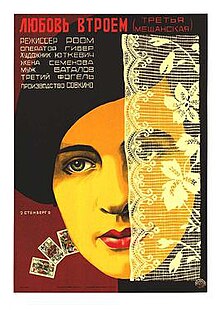Bed and Sofa
| Bed and Sofa | |
|---|---|

Movie Poster for Tretya meshchanskaya
|
|
| Directed by | Abram Room |
| Produced by | Sovkino Studio |
| Written by |
Viktor Shklovsky Abram Room |
| Starring |
Nikolai Batalov Lyudmila Semyonova Vladimir Fogel |
| Cinematography | Grigorii Giber |
|
Release date
|
|
|
Running time
|
75 minutes |
| Country | USSR |
| Language | Silent |
Bed and Sofa (Russian: Третья Мещанская) is the English name of a 1927 Soviet silent film originally released in the Soviet Union as Tretya meshchanskaya, and is sometimes referred to as The Third Meschanskaya. In addition to the title, Bed and Sofa it was also released outside of the Soviet Union under the alternate titles of Three in a Cellar, Old Dovecots, and Cellars of Moscow. The film gets its Russian title from the street on which the main characters live, Third Meshchanskaia Street.
Directed by Abram Room and written by Room and Viktor Shklovsky, the film starred Nikolai Batalov as the husband, Kolia, Lyudmila Semyonova as the wife, Liuda, and Vladimir Fogel as the friend, Volodia. Billed as a satire and comedy, Bed and Sofa nonetheless portrayed the realities of the Moscow working poor, while also dealing with starkly sexual situations such as polygamy and abortion. It was originally banned in both the United States and Europe due to those stark sexual situations.
The screenplay was supposedly based on the true love story of the acclaimed Russian poet Vladimir Mayakovsky who lived with his "muse" Lilya Brik and her husband Osip Brik for some years. The characters themselves also resembled the trio, with Vladimir Fogel as Mayakovsky, Lyudmila Semyonova as Lilya and Nikolai Batalov as Osip Brik. The parallels were so obvious that some critics and associates accused Viktor Shklovsky of indelicacy and gossiping. Shklovsky himself never openly admitted it, yet in his diaries he mentions that during the work on the screenplay they «were living next to Mayakovsky and Lilya Brik», which is an obvious hint.
While movies made in the USSR would soon be regulated to the ideals of Soviet realism, some films at this time were able to present starker themes. Even so, Bed and Sofa was controversial at the time of release in the Soviet Union, due to its focus on human relationships, while the state and the party are almost completely disregarded. In fact, at one point Kolya even declines to go to a Party meeting. In addition, the film's resolution is ambiguous and comes about without any input from the collective.
...
Wikipedia
